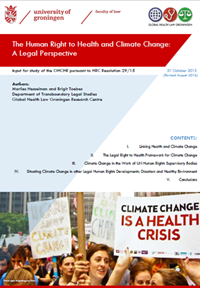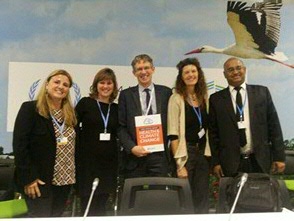Climate Change

Climate change is a public health emergency. Continuing global warming is the single biggest threat to global health, peace, and security, a crisis multiplier, and a significant driver of health inequalities. It also raises profound issues of human rights and dignity.
Climate change negatively affects opportunities for health both directly - e.g. through increased exposure to heat, cold, floods, droughts and wildfires, or altered disease patterns - and indirectly - by suddenly or slowly disrupting people's access to essential underlying determinants of health, such as food and nutrition, housing, access to safe and potable water and adequate sanitation, safe and healthy working conditions, and a healthy living environment (e.g. large scale disasters, desertification). Adequate protection of human health requires effective and timely responses in terms of mitigation and adaptation, including as a matter of strong national and international legal protection and responses. Since the IPCC warns about the physical limits to and dangers of focusing excessively on future adaptation strategies, mitigation seems a prime concern in meeting health concerns.
There is increasing evidence that the impacts of climate change not only affect the physical health of individuals and communities, but their mental health as well. Mental health is not only at stake due to the devasting impacts of climate disasters, but also in the sense of experiences of eco-anxiety and solastalgia: the overwhelming sense of loss of the environment, exacerbated by feelings of lack of control over this process, and our (in)ability to cope with this. Climate litigation by youth groups increasingly gives expression to these mental health effects; but how can such factors be better captured in legal terms, and in terms of human rights?
Within GCHL, a growing climate and health research team explores and evaluates the legal dimensions of health and climate change, and the various legal regimes that are available to ensure human and planetary health in the face of global climate change. This includes international and regional human rights frameworks, including especially the right to physical and mental health, the right to a healthy environment, or the right to a stable climate, but also other relevant (hard and soft) legal instruments of prime importance in this field, such as the UN Framework Convention on Climate Change (UNFCCC) and the 2015 Paris Agreement, the UN Sendai Framework for Disaster Risk Reduction and UN Sustainable Development Goals.
Strong legal frameworks to curb climate change, which can effectively protect human health against negative climate-related impacts, must be informed by robust health evidence of the public health sector. Close interdisciplinary cooperation between public health and legal experts is necessary to build robust legal frameworks and support litigation, including for the protection of countries or persons with heightened vulnerability to climate change, i.e. in the Global South, or for children, women, displaced persons, indigenous peoples, small farmers or those with pre-existing health conditions.
What rights and obligations for the protection of health already exist in the face of climate change, for various different State and non-State actors, and for different vulnerable groups? Also, what are identifiable challenges, short comings and opportunities for greater legal protection?
How can climate and health law and policies be strengthened through better cooperation between the legal and public health professions? How can climate litigation be strengthened by improving health-related arguments with robust and diverse evidence of negative health impacts at country, regional, local or personal level?
Key publications of the team
-
Hesselman, Patterson, Phelan, Meier, Tahzib, Gostin, Ensuring health at the heart of the Climate Change Advisory Opinion (2025) The Lancet
-
Phelan, Patterson, Tahzib, Meier, Hesselman, Chenguang, Gostin 'Collective action and legal mobilisation for the right to health in the climate crisis' (2024) The Lancet
-
Patterson, Hesselman and Tahzib, As governments fail us on climate change, courts are forced to consider ethical questions (2024) Journal Climate Change and Health
-
Hesselman and Meier, Environmental Health: Regulating Clean Air & Water as Underlying Determinants of Health (2024) in: Gostin & Meier, Global Health Law & Policy: Ensuring Justice for a Healthier World (Oxford University Press)
-
Patterson, Meier, What’s Next for the ICJ Advisory Opinion? A Proposal for a UN General Assembly Special Session on Climate Change (2025) Opinio Juris
-
Phelan, Meier, Patterson, Hesselman, Tahzib, Gostin, The ICJ Advisory Opinion: a legal mandate for planetary health (2025) The Lancet
From Analysis to Action. Climate Change Litigation: A Guide for Public Health Practioners (November 2023) endorsed by the Global Network for Academic Public Health (GNAPH), the European Public Health Association (EUPHA), Lancet Countdown, the Association of Schools of Public Health in the European Region (ASPHER), the Global Consortium on Climate and Health Education (GCCHE) and the World Federation of Public Health Associations (WFPHA).


Researchers
Current research assistants
-
Monique van Cauwenberghe (Health Arguments in Climate Litigation related to Displacement)
-
Daphné Bruggemann (Right to Mental Health and Climate Change).
Further inquiries for research projects in this area are welcomed.
Research outputs
Publications
|
Publications
|
|---|
|
GCHL & UK Faculty of Public Health, From Analysis to Action. Climate Change Litigation: A Guide for Public Health Practioners (November 2023 - PDF)
|
|
D. Patterson, M Hesselman et al (2022) Post COP26: legal action now part of public health’s environment and climate change toolbox, European Journal of Public Health 519-520
|
|
D. Patterson (2021) ‘The right to health and the climate crisis: the vital role of civic space’ Health and Human Rights Journal
|
|
M. Hesselman (2021) 'Climate change as a global health threat in International Climate Law and Human Rights Law, in Toebes et al, Global Health Law Disrupted: COVID-19 and the Climate Crisis (TMC Asser, Preadviezen No. 148) 87-130
|
|
M. Hesselman (2021) 'EU Climate Law and Human Rights' in Woerdman et al, Essential EU Climate Law(Edward Elgar, 2nd ed.) 259-292 (Google books).
|
|
M. Hesselman (2021) 'Domestic climate litigation’s turn to human rights and international climate law'in: Merkouris, Fitzmaurice and Brus (eds), Research Handbook on International Environmental Law(Edward Elgar, 2nd ed) 369-393.
|
|
M. Hesselman, 'Access to Disaster Risk Information, Early Warning and Education and Awareness: Implementing the Sendai Framework through International Human Rights Law' in Katja Samuel and Marie Aronsson-Storrier, International Law and Disaster Risk Reduction (Cambridge University Press 2019) 188-216.
|
|
M. Hesselman 'Gender and Health in the Context of Disaster Risk Reduction and Climate Change' (15 November 2017) Global Health Law Groningen Blog Post
|
|
Marlies Hesselman & Lottie Lane (2017), 'Disasters and Non-State Actors: A Human Rights-Based Approach' Disaster Prevention and Management 26(5), pp. 526-539 (open access)
|
|
Lottie Lane & Marlies Hesselman (2017) 'Governing Disasters: Embracing Human Rights Law in a Multi-Level, Multi-Actor Governance Sphere' , Governance and Politics 5(2), pp. 93-104 (open access)
|
|
Marlies Hesselman & Brigit Toebes, The Human Right to Health and Climate Change: A Legal Perspective , Global Health Law Groningen Research Paper (and Input to the Study of the UNOHCHR (31 October 2015) (https://papers.ssrn.com/sol3/papers.cfm?abstract_id=2688544)
|
|
Marlies Hesselman, COP21 and the Right to Health: A Right to a Healthy Climate Deal? , Global Health Law Groningen Blog (9 December 2015).
|
|
Marlies Hesselman, Energy poverty, climate change, and the right to health: international obligations to cooperate for clean cook stoves ? Global Health Law Groningen Blog, (14 October 2015).
|
|
Dug Cubie & Marlies Hesselman (2015) Accountability for the Human Rights Implications of Natural Disasters: A Proposal for Systemic International Oversight , Netherlands Quarterly of Human Rights 33(1), 9-41.
|
|
Marlies Hesselman (2014) Regional Human Rights Regimes and Humanitarian Obligations in the Event of Disasters . In A. Zwitter, C. Lamont, H-J. Heintze, & J. Herman (Eds.), Humanitarian Action: Global, Regional and Domestic Legal Responses to Local Challenges. (pp. 202-227). Cambridge: Cambridge University Press.
|
|
Hesselman, M. (2013). Establishing a Full ‘Cycle of Protection’ for Disaster Victims: Preparedness, Response and Recovery according to Regional and International Human Rights Supervisory Bodies . Tilburg Law Review, 18(2), 106-132.
|
Activities
|
Activities
|
|---|
|
D. Patterson, M. Hesselman et al, '‘Future-proofing your human rights research: Climate change as a cross-cutting issue for human rights research' (26 September 2023) Organisers Workshop for Netherlands Network of Human Rights Research
|
|
M. Hesselman, 'Strategic litigation on health, human rights and climate change' (16 June 2023) Conference on Strategic Litigation and Public Health, Liverpool
|
|
D. Patterson et al, Workshop: Climate crisis and public health: public health practitioners are key to successful litigation(Nov. 2022) European Journal of Public Health iii200-iii201
|
|
D. Patterson and A. Garde, "Building capacity to use legal tools to address climate change through a public health lens" (Nov. 2022)European Journal of Public Health iii473
|
|
M. Hesselman, 'Strategic Litigation, Human Rights and Health' (Nov. 2022) 14th European Public Health Conference (EUPHA)
|
|
M. Hesselman, 'Environmental Health, Climate and Pandemic Risk: Responding through Global Health' (Nov. 2022) Panel organised at NEEDS2022 Conference, Copenhagen
|
|
M. Hesselman, 'Climate change and courts' (22 April 2022) Sabin Center/UNEP Annual Conference on Global Climate Litigation, New York/online
|
|
Marlies Hesselman, 'The Right to Health and Climate Change: Human Rights Based Approaches to Transformative Climate Adaptation (7 December 2018) Presentation at Side Event UNFCCC COP 24, Katowice, Poland
|
|
Marlies Hesselman, 'Regulating Indoor and Outdoor Air Pollution in International Law' (3 July 2018) Lecture at Jean Monnet Summer School, Climate Change, Health and Environment, University of Salerno
|
|
Marlies Hesselman, Comment on Draft CEDAW 36: Gender and Disaster Risk Reduction in a Changing Climate: A Right to Health Perspective (16 October 2017) Utrecht University/SIM, Netherlands.
|
|
Marlies Hesselman, Contours of a Human Right to Sustainable Energy services Access for All? (14 September 2017) Inter-University Legal Research Network Conference, Groningen.
|
|
Marlies Hesselman, International Human Rights Law and Disaster Risk Reduction: Evidence from International Human Rights Practice (1 July 2017) Reading University/Walker Institute, UK.
|
|
Participation in the UN OHCHR Expert Meeting on Climate Change and Human Rights (6-7 October 2016, Geneva, Palais des Nations)
|
|
Marlies Hesselman, ‘ Environmental Health’, ILA Committee on Global Health Law (13 March 2017, Graduate Institute for International Law, Geneva, Switzerland)
|


